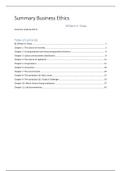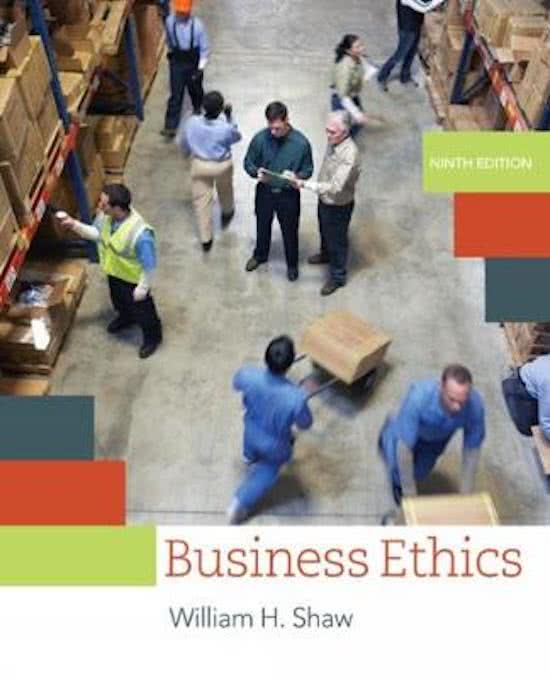Summary Business Ethics
William H. Shaw
Summary made by Erik G.
Table of contends
By William H. Shaw .................................................................................................................................. 1
Chapter 1: The nature of morality ........................................................................................................... 2
Chapter 2: Consequentialist and nonconsequentialist theories ............................................................. 4
Chapter 3: Justice and economic distribution ......................................................................................... 8
Chapter 4: The nature of capitalism ...................................................................................................... 12
Chapter 5: Corporations ........................................................................................................................ 15
Chapter 6: Consumers ........................................................................................................................... 18
Chapter 7: The environment ................................................................................................................. 23
Chapter 8: The workplace (1): Basic issues ........................................................................................... 27
Chapter 9: The workplace (2): Today’s Challenges ............................................................................... 33
Chapter 10: Moral choices facing employees ....................................................................................... 37
Chapter 11: Job discrimination.............................................................................................................. 42
,Chapter 1: The nature of morality
Introduction discusses the rise and fall of Enron due to unethical accountancy.
Ethics deal with the moral rules that govern and limit our conduct. It investigates questions of right
and wrong, fairness and unfairness, good and bad, duty and obligation, and justice and injustice, as
well as moral responsibility and the values that should guide our actions.
Morality and ethics is quite the same.
Business ethics is the study of what constitutes right and wrong, or good and bad, human conduct in
a business context.
A business is any organization whose objective is to provide goods or services for profit.
Businesspeople are those who participate in planning, organizing, or directing the work of business.
An organization is a group of people working together to achieve a common purpose.
The three moral standards. Page 5
Moral standards are not made by official bodies. Their validity depends not on official fiat
(goedkeuring) but rather on the quality of the arguments or the reasoning that supports them.
Etiquette refers to the norms of correct conduct in polite society or, more generally, to any special
code of social behaviour or courtesy.
Right and wrong in etiquettes express judgments about manners, not about ethics.
Morality and Law: There are four kinds of law
- Statutes (are enacted by legislative bodies) e.g. speed tickets
- Administrative regulations. E.g. licensing of physicians
- Common law. Law set up after courts have decided in a certain way
- Constitutional law
Legality should not be confused with morality. 1. Breaking the law isn’t always or necessarily
immoral, and 2. the legality of an action doesn’t guarantee its morality.
Professional codes lie somewhere between etiquette and law. But violation of a professional code
may result in the disapproval of one’s professional peers and, in serious cases, loss of one’s license to
practice that profession.--> sometimes the codes are unwritten.
Where does morality come from?
Religion
- Why is this wrong?
o A desire to avoid hell is not the only reason people have morals
o The incentives in religion (bible) can be vague (e.g. killing is wrong, but what about
war?
o Some people argue that when something is wrong it is solely because it’s against
God’s commandments. But rape isn’t wrong just because of the commandment.
Ethical relativism, The theory that what is right is determined by what a culture or society says is
right.
E.g. Abortion is immoral in Catholic Ireland but no problem, so moral, in Japan.
It solely depends on where you are in the world and what morals they uphold.
2
, Some mistakes with this is for example slavery. Back in the days they thought it was moral, but was it
though? Ethical relativist’s also believe that moral standards don’t evolve in righteousness. Morals
back in the day were not better or worse than morals now.
Albert Carr argues that morals in business are different than they might be in normal societies.
Accepting a moral principle is not a purely intellectual act like accepting a scientific hypothesis or
mathematical theorem. We all have to pause and reflect on our own moral principles and practical
implications of those principles.
Our conscience evolved as we internalized the moral instructions of the parents or other authority
figures who raised us as children.
Conscience is not a perfectly reliable guide to right and wrong and isn’t always helpful
Moral principles and self-interest sometimes conflict each other.
Following moral principles is in our best interest. Moral behaviour is consistent with profitability.
Having a moral principles follows from a desire to follow the principle for its own stake. Of course
there are exceptions.
When morality and self-interest conflict, what you choose to do will depend on the kind of person
you are.
Paradox of hedonism (or selfishness) Individuals who care only about their own happiness will
generally be less happy than those who care about others.
Morality in the narrow sense concerns the principles that do or should regulate people’s conduct
and relations with others. It’s a moral code of an individual or a society.
Morality in the broad sense means not just the principles of conduct that we embrace, but also the
values, ideals, and aspirations that shape our lives.
Aristotle argued that there is more than being excellent in a certain field. But we have to strive to be
good humans overall.
Organizational norms always exists in organizations or groups. It is the shared acceptance of
organizational norms and rules by its members. It can take different forms; it can be conscious or
unconscious, overt (openlijk) or implicit (stilzwijgend).
Pressure to meet unrealistic business objectives and deadlines, or to be a team player are the leading
cause of unethical behaviour.
Solomon Asch’s conformity study See page 22
Several aspects of corporate structure and function work to undermine individual moral
responsibility. Organizational norms, pressure to conform (sometimes leading to groupthink), and
diffusion of responsibility inside large organizations can all make the exercise of individual integrity
difficult.
Groupthink happens when pressure for unanimity within a highly cohesive group overwhelms its
members’ desire or ability to appraise the situation realistically and consider alternative courses of
action.
Pressure to conform to the group and to adhere to its norms and beliefs can lead to the surrender of
individual moral autonomy. As a result, responsibility for what am organization does can become
fragmented of diffused (diffusion of responsibility).
3







